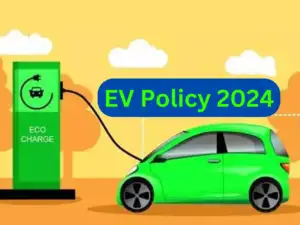Font size:
Print
India’s New EV Import Policy
What is India’s latest approach to localising EV manufacturing?

Context: In a landmark move aimed at accelerating the adoption of electric vehicles and attracting foreign investment, the Indian government has introduced a new EV policy titled the Scheme to Promote Manufacturing of Electric Passenger Cars in India (SPMEPCI). This policy aims to transform India into a global EV manufacturing hub while supporting its climate goals, job creation, and industrial growth.
Key Features of the EV Policy
-
- Import Duty Reduction: Import duties on Completely Built Units (CBUs) of electric four-wheelers with a minimum Cost, Insurance and Freight (CIF) value of $35,000 have been reduced from 110% to 15%. This concession is valid for five years from the date of approval.
- Annual Import Cap: Automakers can import up to 8,000 electric cars per year at a reduced rate. Unutilised import quotas can be carried over to the next year.
- Incentive Cap: The total benefit from this scheme is capped at Rs 6,484 crore or the actual investment made, whichever is lower.
- Investment Commitment: Minimum investment required: Rs 4,150 crore (~$500 million). Investments can include R&D, machinery, and tools, with:
- 5% allowed for charging infrastructure
- 10% for land and factory buildings
Eligibility Criteria & Milestones
- Turnover Requirements: ₹2,500 crore by Year 2, ₹5,000 crore by Year 4, and ₹7,500 crore by Year 5.
- Local Value Addition: At least 25% by Year 3 and 50% by Year 5.
- Eligibility: Applicants must have at least ₹10,000 crore in global automotive revenue or ₹3,000 crore in assets (for investment firms).
- Application Window: The application window will open shortly and remain available for 120 days, with flexibility to reopen until March 15, 2026.
Who’s In—and Who’s Not?
- Global automakers such as Mercedes, Volkswagen-Skoda, Hyundai, and Kia have shown interest in applying this policy to tap into India’s growing EV market.
- However, Tesla, the American EV giant that had previously lobbied hard for lower import duties, has declined to participate.
- In early 2024, reports suggested Tesla might invest $2–3 billion in India. However, Elon Musk postponed his visit to India in April 2024 and shelved factory plans.
- Tesla now intends to sell imported CBUs from Germany, which would attract 110% duty.
- The company is looking to establish showrooms, not a factory, in India.
- Experts note that Tesla’s pricing puts it out of reach for most Indian consumers: Tesla Model 3 costs $42,490 (~Rs 37 lakh) — well above the Rs 20 lakh threshold where most Indian passenger cars are priced.
Strategic Exclusion of Chinese Companies
- The scheme excludes Chinese firms due to national security concerns.
- Union Minister Piyush Goyal stated that India must be cautious about foreign investments, especially those from China, citing risks of dumping and geopolitical concerns.
- Past rejections:
- BYD’s $1 billion plan was rejected in July 2023
- Great Wall Motors (GWM) shelved its plans due to lack of approval
- BYD India officially confirmed in October 2024 that it is not applying under this policy.
India’s EV Market: Small but Rapidly Growing
- India’s EV market is still in its early stages, with electric vehicles making up just 3% of total car sales in 2024—far behind China (≈50%) and the US (>10%). In contrast to China’s 11 million electric car sales in 2024, India sold only about 111,300 units.
- According to research firm ICRA, EV penetration in passenger vehicle sales is expected to rise to 15% by FY30, up from 3% in FY25, driven by broader product offerings, improved charging infrastructure, and declining battery prices.
Global EV Landscape
- China’s EV Push: China’s EV success is backed by its national policy, ‘Made in China 2025’, and massive incentives:
- Subsidies up to $15,000 per vehicle.
- Manufacturer grants for EVs with 300+ km range.
- Up to $2,730 for scrapping older cars to buy EVs.
- Government-funded charging infrastructure expansion.
- US EV Policy: The Inflation Reduction Act (IRA) has supercharged the US EV ecosystem:
- $7,500 federal tax credit for new EVs.
- $4,000 tax credit for used EVs.
- $35/kWh production subsidy for batteries, $10/kWh for modules.
Additional state-level incentives and support for EV manufacturing and battery supply chains.
Trade Deals and Tariff Challenges
- While India’s new EV policy hinges on tariff incentives, upcoming trade deals with the US, UK, and EU could complicate things.
- India has agreed to lower car import tariffs to 10% under a quota system with the UK, although small EVs have been excluded. The US and EU are pushing for similar concessions, which might reduce the competitiveness of India’s new scheme.
The Global EV Surge
- Globally, EV adoption is surging:
- 17 million electric cars sold worldwide in 2024.
- IEA estimates 2025 sales to exceed 20 million, or 25% of global car sales.
- China leads with EVs forming almost 50% of its total car market.
- The US sold 1.6 million EVs in 2024, with 24 new models introduced.
- While Tesla still dominates the US EV market, its share has declined from 60% in 2020 to 38% in 2024, with increasing competition from newer models.
Subscribe to our Youtube Channel for more Valuable Content – TheStudyias
Download the App to Subscribe to our Courses – Thestudyias
The Source’s Authority and Ownership of the Article is Claimed By THE STUDY IAS BY MANIKANT SINGH





